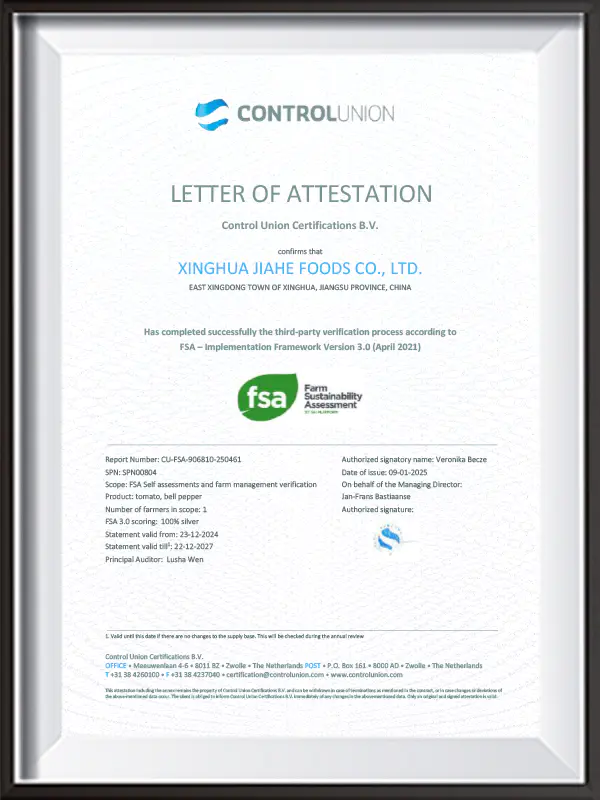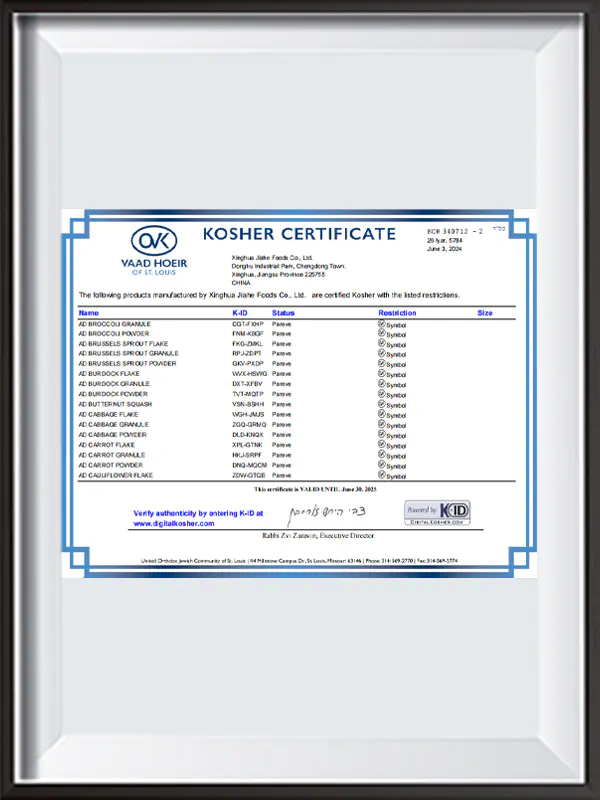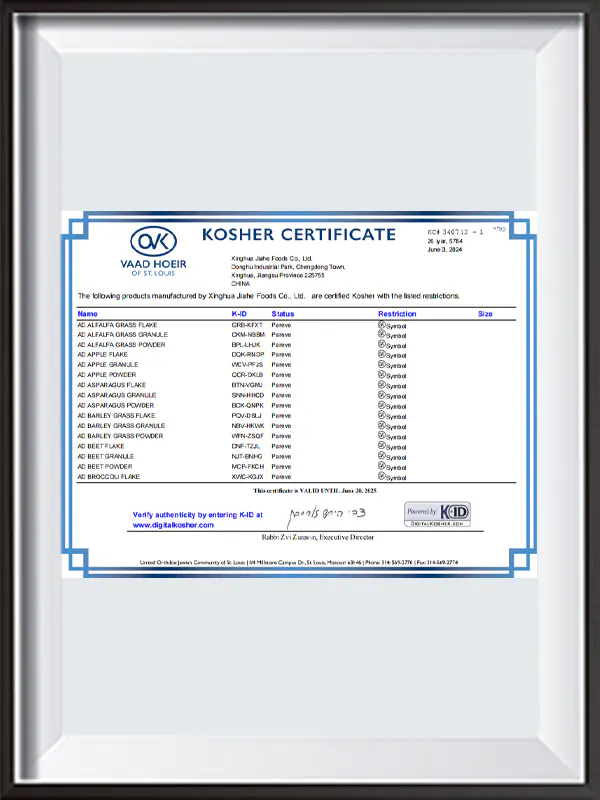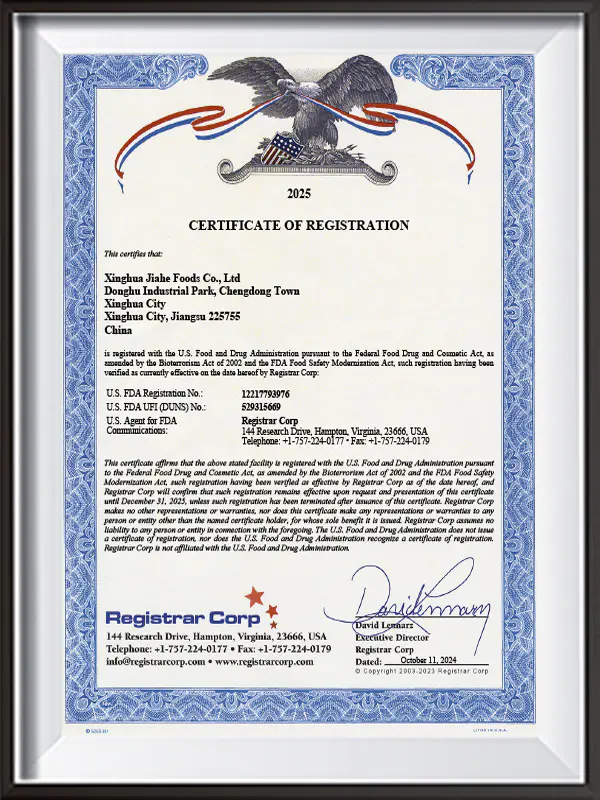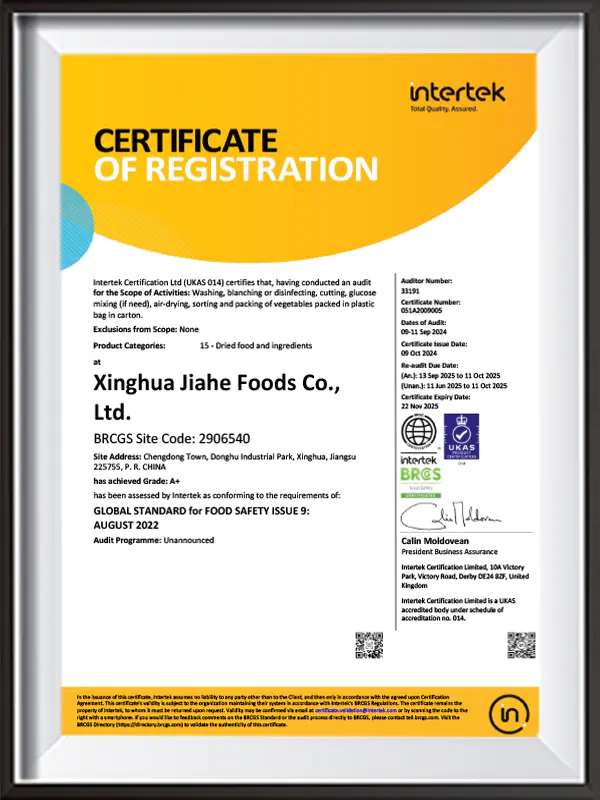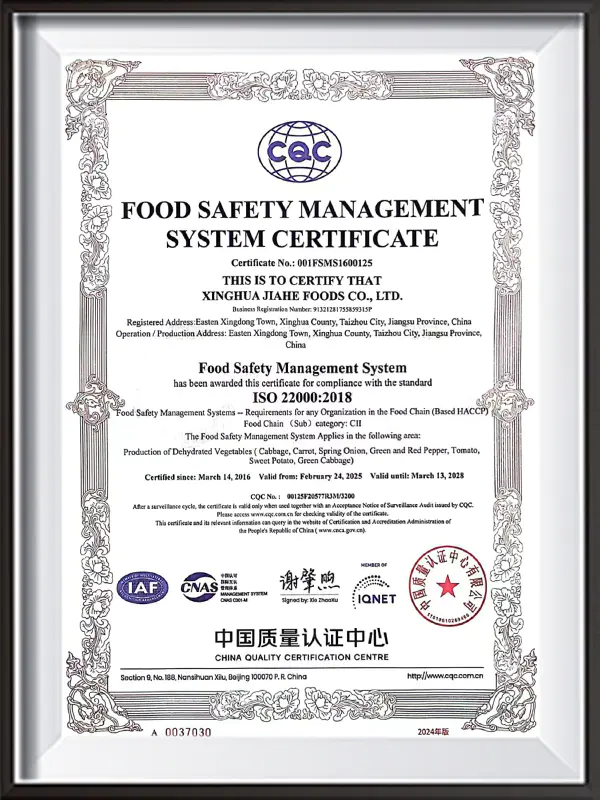Xinghua Jiahe Foods Co., Ltd is China Dehydrated Apple Manufacturers and Dehydrated Apple Factory, located in Xinghua city Jiangsu province, established in 2003. We are an experienced manufacturer and distributor of air dried vegetables and fruits in China. After more than 10 years fast development, now we are proud of being one of the top 3 manufacturers in China. We have built ourselves as a whole-range of consistent, affordable, and safe food products to the ingredient market. Our plant takes up an area of 25`000㎡with an annual capacity 8000 tons. We also have more than 300 hand-sorting workers, this is the last critical control point. Some defect materials which are out control of the facilities will be removed clearly. We have a multiple supply range. As Dehydrated Apple Exporter & Importer, we can supply you not only flake, dice, granules -- but also powder according to your need. All finish products are made from selected, fresh materials.
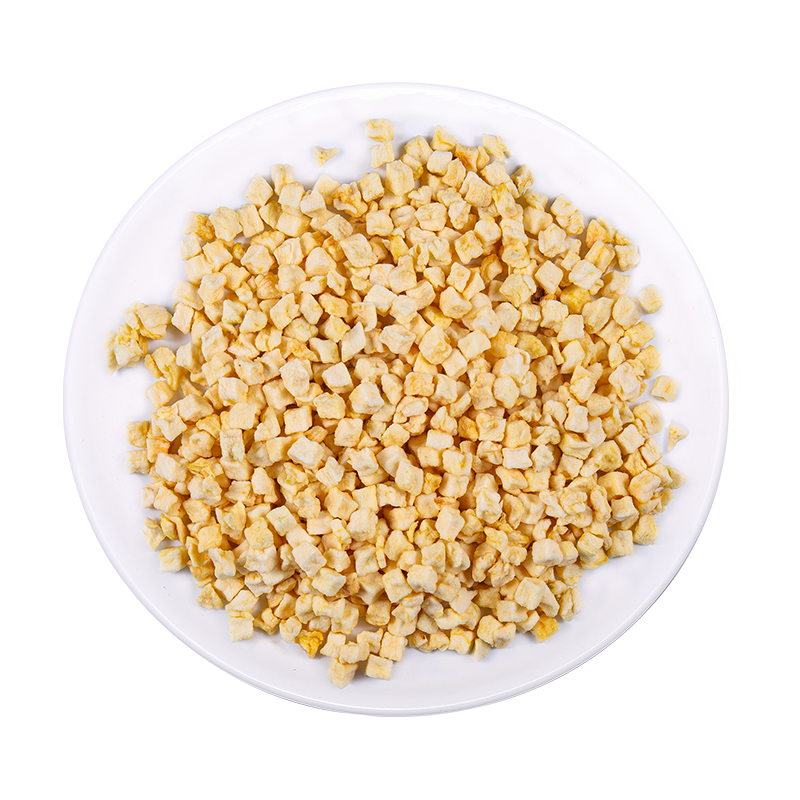
Dehydrated Apple
Low moisture apples are prepared from sound ripened fruit which is washed, mechanically peeled, cored, cut, and dried.The processing sequence initiates with rigorous cleaning protocols, material segregation, and HACCP compliance measures before proceeding to particle size modification via blade cutting or abrasive milling techniques
- 3/8"
- 1/4"
- CUSTOM SIZE
Dried apples are widely used in instant meals (e.g., seasoning packets for noodles, ready-to-eat soups), snacks (e.g., apple chips, trail mixes), nutritional supplements, and baking ingredients. Additionally, dehydrated apples are utilized in culinary applications such as desserts, salads, or beverages (e.g., infused water)
Authentic reliable quality naturally stands out and fears no comparison.
Provide you with the latest enterprise and industry news.
-
How resistant is the Dehydrated Green Pepper to microbial growth, mold, or spoilage during storage and transport?
Low Moisture Content: One of the most critical factors contributing to the microbial stability of Dehydrated Green Pepper is its extremely low moisture content achieved during the dehydration process. Water is a fundamental requirement for the growth of bacteria, yeast, and mol...
-
How should Dehydrated Tomato be stored to maintain its shelf life, color, and flavor over time?
Temperature Control Maintaining the proper storage temperature is critical for preserving the quality of Dehydrated Tomato over time. Ideally, it should be stored in a cool, dry environment between 10–25°C (50–77°F). Elevated temperatures accelerate chemical reactions such as Mai...
-
How does the particle size, cut type (shredded, sliced, diced), or granulation of Dehydrated Cabbage affect rehydration performance and application in food processing?
Particle Size and Surface Area:The particle size of Dehydrated Cabbage has a profound effect on its water absorption rate, rehydration kinetics, and suitability for different culinary applications. Smaller particles or finely shredded cabbage present a higher surface-area-to-vo...
What is dehydrated apple? How is it processed?
Dehydrated apple is made by removing the water from fresh apples and turning them into a dry food form that is easy to store and transport. This process not only maintains the natural flavor and nutrients of the apples, but also greatly extends their shelf life, making it easier for consumers to store them for a long time and use them when needed. The processing of dehydrated apples starts with material selection to ensure that ripe and healthy apples are used. These apples undergo strict pre-processing steps such as washing, peeling, core removal and cutting. Each step requires strict hygiene standards to ensure the quality of the final product. Especially in the peeling and core removal stages, the precise control of mechanical equipment allows each apple to maintain the best flavor and taste.
During the cutting process, apples can be cut into different shapes such as slices or small pieces according to needs, which provides uniform drying conditions for the subsequent drying process. Next, the apples enter the drying stage, usually using technologies such as hot air drying, freeze drying or microwave drying. Hot air drying is the most common method, which evaporates the water in the apples through high-temperature air; while freeze drying can maximize the retention of apple flavor and nutrition. Microwave drying uses microwave energy to quickly remove moisture and improve production efficiency.
Dehydrated apples need to be strictly screened and graded to ensure that the degree of drying of each apple is consistent and meets the standards. After packaging, dehydrated apples can be sold on the market in different forms such as flakes, powder or granules.
Application and market demand of dehydrated apples
Dehydrated apples have been widely used in many industries, mainly for snacks, baking, beverages, seasonings and as food ingredients. In the field of snacks, dehydrated apples have become a healthy snack loved by more and more consumers due to their natural and additive-free characteristics. It not only provides natural sweetness and fiber, but also has a long shelf life and is easy to carry. It is suitable for all kinds of consumer groups. Especially today when health awareness is increasing, dehydrated fruits have gradually become a popular choice in the market.
In baking and beverage production, dehydrated apples are also one of the indispensable raw materials. Apple slices or apple powder are often used to make products such as nut biscuits, cakes, juices and mixed drinks, bringing rich fruity aroma and natural flavor to these foods. Dehydrated apples are also widely used in the production of seasonings, especially in fruity sauces, soups, ready-to-eat meal packs and other products. Dehydrated apples can enhance the flavor of the product while simplifying the production process.
In terms of market demand, as consumers become more interested in healthy and natural foods, the market demand for dehydrated apples is showing a growing trend. Especially in the European and American markets, dehydrated apples, as a high-fiber, low-fat healthy food, are favored by more and more consumers. In addition, with the increasing global demand for convenient foods, the application areas of dehydrated apples are also gradually expanding, from raw materials to finished products, from low-end to high-end markets, there is a wide range of market demand.
However, the market for dehydrated apples also faces certain competition, especially in terms of price and product innovation. There are many participants in the global dehydrated fruit market, and competition among companies is becoming increasingly fierce. In order to meet the personalized needs of consumers, more and more companies have begun to develop various forms of dehydrated fruit products, such as low-sugar, no-additive, no-preservatives and other products, to adapt to the market's high attention to healthy products.
Xinghua Jiahe Foods Co., Ltd's advantages and future prospects in the dehydrated apple industry
Since its establishment in 2003, Xinghua Jiahe Foods Co., Ltd has focused on the production of high-quality dehydrated vegetables and fruits, and has gradually become an important player in the industry. The company has complete production equipment and advanced technology, including powder and granule workshops, color screening and processing lines, and packaging production lines. The company continues to upgrade its equipment, especially in color sorting, metal detection and quality control, to ensure that each batch of products can meet international food safety standards.
In the production of dehydrated apples, Xinghua Jiahe Foods Co., Ltd uses advanced drying technology and strict quality control measures to ensure that each piece of dehydrated apple can maintain the best flavor and nutrients. Especially in the selection of raw materials and processing technology, Xinghua Jiahe Foods Co., Ltd strictly monitors every link, from planting, harvesting to processing, to ensure that the quality of each apple meets high standards. These advantages enable Xinghua Jiahe Foods Co., Ltd to stand out in the fiercely competitive market and meet the demand for high-quality dehydrated apple products in the domestic and foreign markets.
In the future, Xinghua Jiahe Foods Co., Ltd will continue to focus on product innovation and market expansion, and plans to add more dehydrated fruit products that meet consumer needs, especially in healthy snacks and food ingredients. The company will also strengthen its global market layout and expand its export share, especially in the European, American and Asian markets. At the same time, Jiahe will continue to optimize production processes and improve production efficiency to cope with the growing market demand for dehydrated fruits.
Through technological innovation, strict quality control and continuous market expansion, Xinghua Jiahe Foods Co., Ltd will further consolidate its leading position in the dehydrated apple and other dehydrated fruit industries and promote the company's continued development in the global health food industry.


 English
English Français
Français Español
Español
